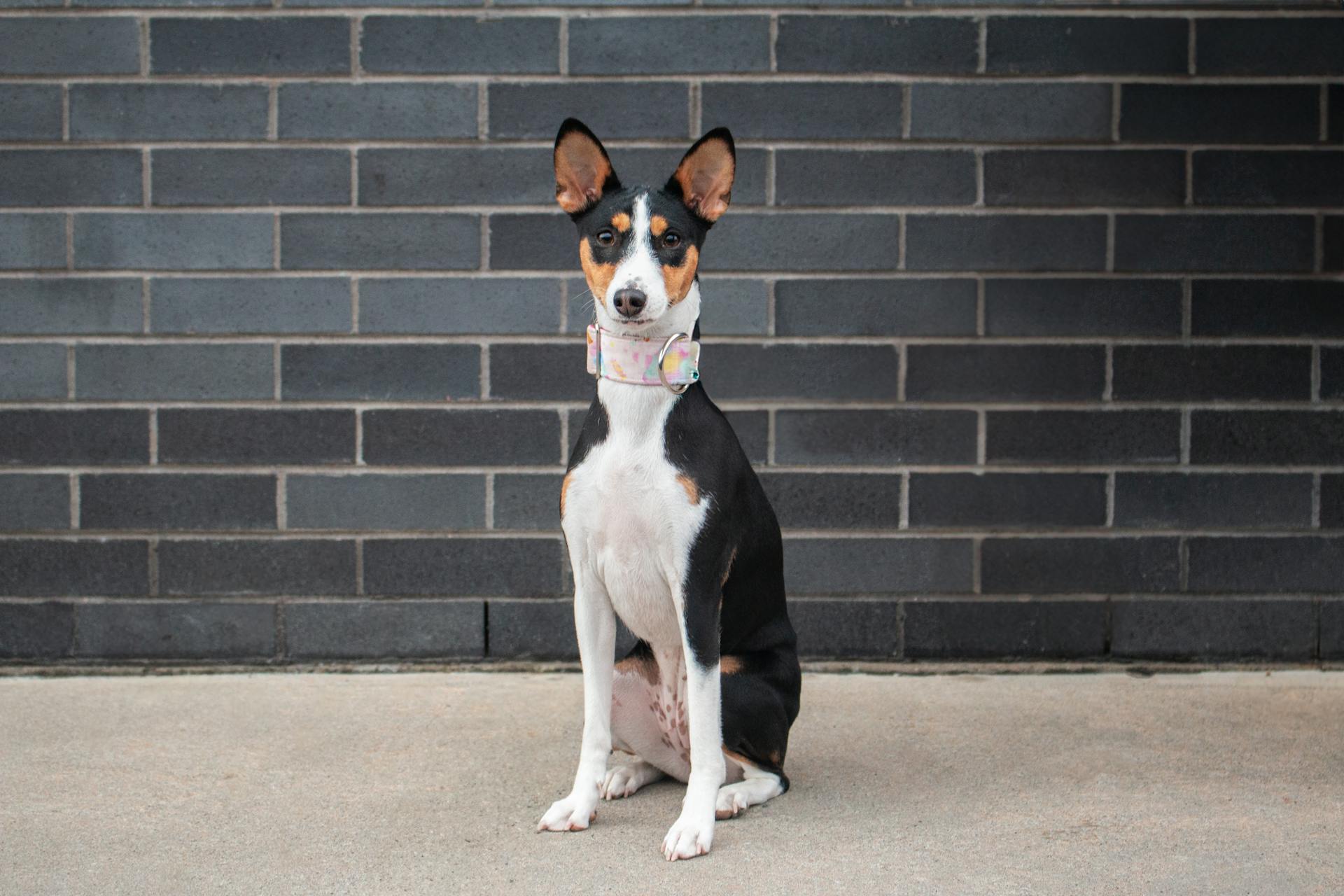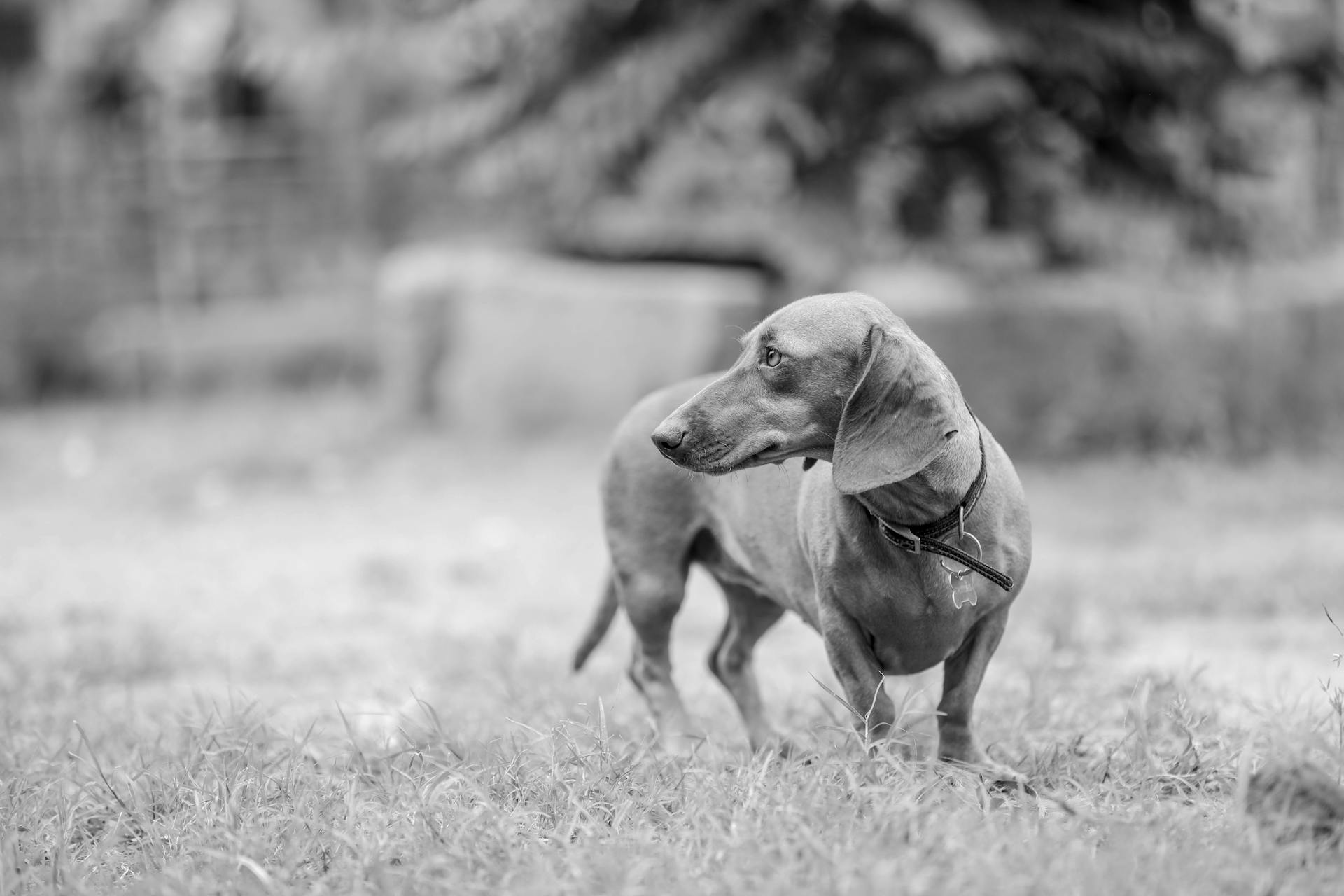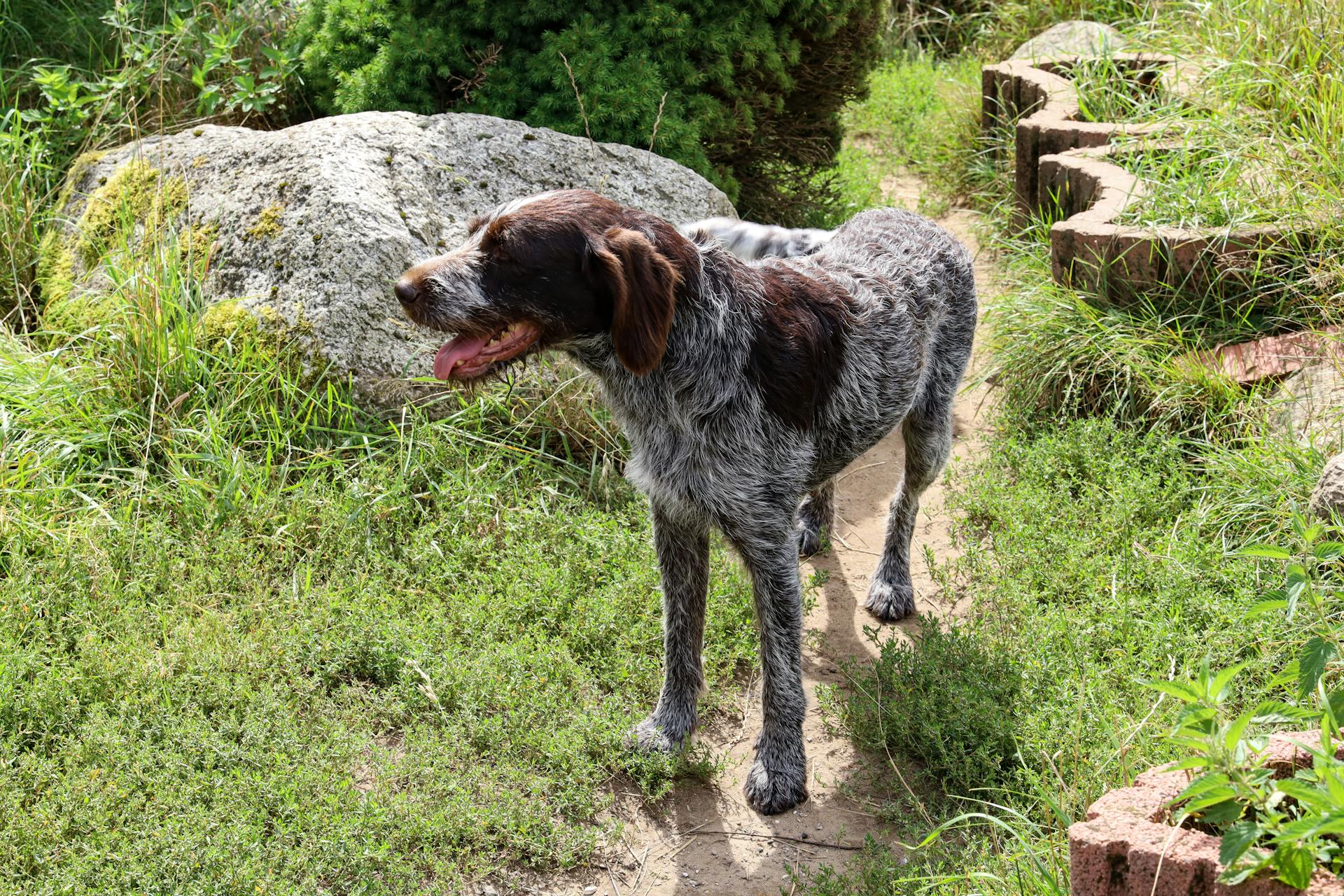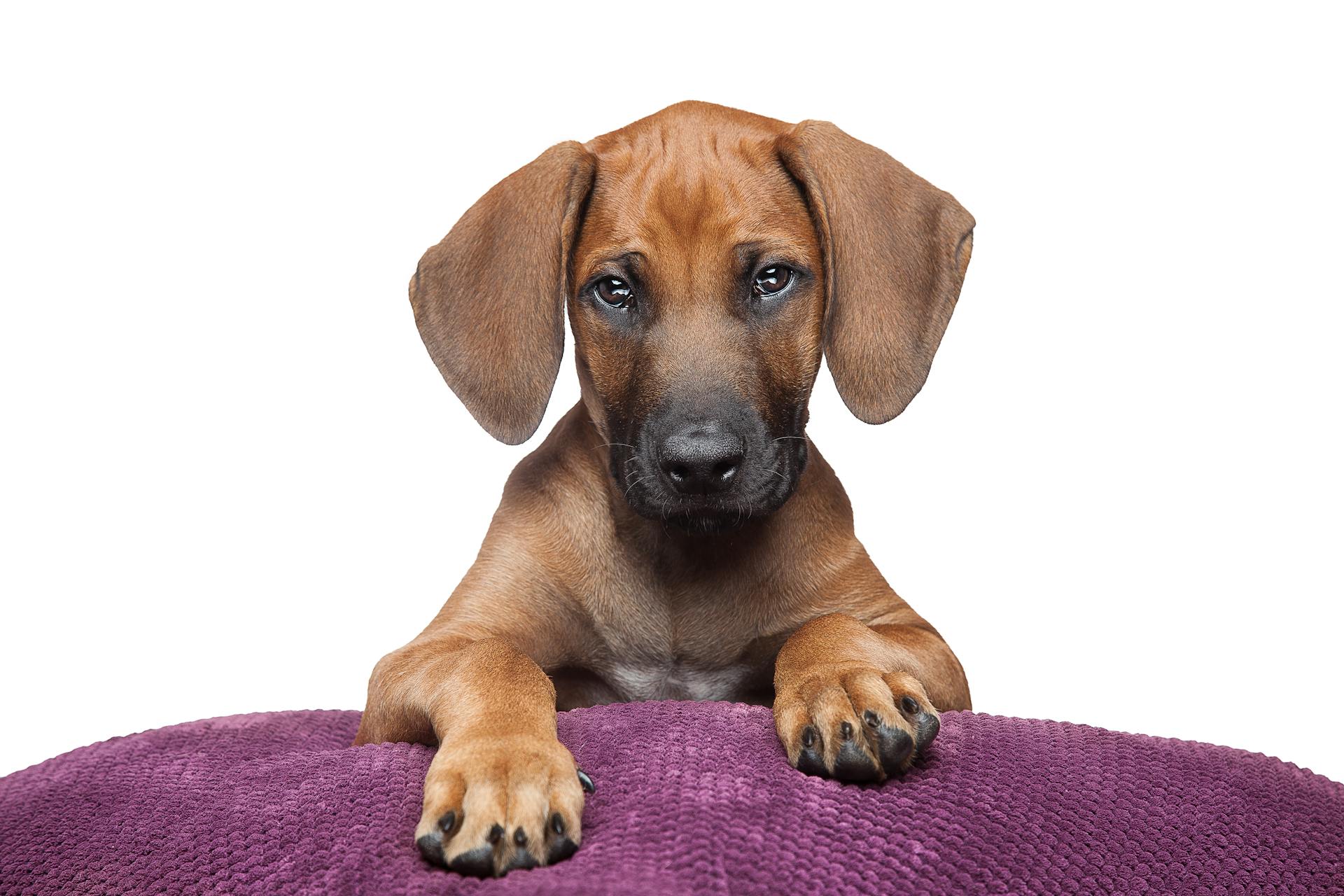
The Rhodesian Ridgeback is a versatile hunting breed that excels in various terrains and conditions.
This breed was originally bred to hunt lions, making them naturally skilled at tracking and tackling large game.
To ensure your Rhodesian Ridgeback is successful on the hunt, it's essential to provide them with adequate exercise and mental stimulation. They require at least 30 minutes of intense exercise daily, which can be fulfilled through activities like running, hiking, or agility training.
With their strong prey drive and independent nature, Rhodesian Ridgebacks can be challenging to train, but consistency and positive reinforcement are key to developing good hunting habits.
Physical Characteristics
The Rhodesian Ridgeback is a powerful and impressive breed, built for hunting and endurance. They typically stand between 24 and 27 inches tall, with males weighing in at around 85 pounds and females weighing around 70 pounds.
Their muscular legs and compact paws make them well-suited for long days of hunting, and their firm back and long neck give them a commanding presence. The Rhodesian Ridgeback's distinctive ridge of hair runs along their spine, growing in the opposite direction to the rest of their coat.
Here are the breed's physical characteristics in more detail:
The Rhodesian Ridgeback's coat is short, dense, and smooth, with a light wheaten to red wheaten color. White markings on the chest and toes are also common, and some individuals may have a dark mask on their face.
You might enjoy: Red Wheaten Rhodesian Ridgeback
Health
Rhodesian Ridgebacks are generally a healthy breed, but like all large breeds, they can be prone to certain health issues.
Hip dysplasia and dermoid sinus are two conditions that can affect Rhodesian Ridgebacks. A UK study found the average life expectancy to be 12 years.
Regular exercise is essential for keeping your Rhodesian Ridgeback healthy and happy. They require a good workout every day, either in the form of a long jog or walk or a strenuous play session.
Ridgebacks enjoy numerous activities, including jogging, hiking, swimming, and tugging. They especially excel in lure coursing, obedience, agility, and nose work.
To prevent joint problems, it's essential to feed your puppy a large-breed puppy food that slows the rate of growth. This can lessen the likelihood of hip dysplasia.
Here are some common health issues that can affect Rhodesian Ridgebacks:
- Canine Elbow and Hip Dysplasia
- Osteoarthritis, or arthritis
It's essential to keep your naturally athletic dog fit and prevent overeating, as this can further damage joints and put unnecessary wear and tear on their joints.
Care and Upkeep
Rhodesian Ridgebacks require a good workout every day, either in the form of a long jog or walk or a strenuous play session.
They enjoy numerous activities, including jogging, hiking, swimming, and tugging, and especially excel in lure coursing, obedience, agility, and nose work.
Their coat sheds moderately but requires little grooming, with weekly brushing and occasional bathing sufficient to keep them looking great.
Some Ridgebacks suffer from dermoid sinus, a congenital condition involving malformation of the neural tube, which can cause infections and spinal issues.
Regular training and early socialization are also important to ensure that your Ridgeback's independent streak doesn't get the better of them.
You'll need to brush your dog's teeth daily, check their ears weekly for any dirt, debris, redness, or other abnormalities, and look at their nails roughly once a month to see whether they need trimming.
A 2022 study revealed a link between a genetic mutation in Rhodesian Ridgebacks and early-onset adult deafness, which can cause dogs to lose their hearing as early as 4 months of age.
Training and Behavior
Training a Rhodesian Ridgeback requires consistency, patience, and positive reinforcement, especially when they're young, as an adult with poor manners can be difficult to control.
Start training your puppy as soon as you bring them home, using positive and consistent methods to teach your pup the right way to behave. This will help them develop good habits and reduce the risk of stubbornness.
Ridgebacks are intelligent, but their independence and strong will can make training challenging. They require consistent training and correct socialization, making them less suitable for inexperienced dog owners and families with younger children.
Early socialization is key to helping your Ridgeback feel comfortable and confident around strangers. Take them to obedience classes and expose them to various environments, people, and dogs to help them develop good social skills.
With proper training and socialization, your Rhodesian Ridgeback will become a loyal and devoted companion, and an excellent watchdog.
See what others are reading: Will Shiba Inu Coin Reach $1
Training
Training your Rhodesian ridgeback requires consistency and patience, as their strong will can complicate the process.
Start training your puppy as early as possible, ideally when they're still young, to avoid dealing with an adult ridgeback that has poor manners.
Consistency is key, so establish a routine and stick to it.
Positive reinforcement is a great way to encourage good behavior in your ridgeback.
Take your dog to obedience classes as soon as they're old enough to learn basic commands and socialize with other dogs.
Socialization is crucial for ridgebacks, who tend to be reserved around strangers.
Regular socialization with different people, dogs, and environments can help boost your ridgeback's comfort and confidence.
Temperament
Rhodesian Ridgebacks are known to be loyal and intelligent, but they can be aloof to strangers.
They require consistent training and correct socialization, making them a less-than-ideal choice for inexperienced dog owners.
A Rhodesian Ridgeback with a good temperament won't attack a stranger for no reason, but they do have a sensitive side and can be easily hurt by rough handling.
They accept correction as long as it's fair and justified, and comes from someone they know and trust.
With proper training, Rhodesian Ridgebacks can be capable of high levels of obedience, but they can be stubborn at times.
They're excellent watchdogs and effective protection dogs, but their power and size may mean they're not the ideal choice for families with small children.
In terms of training, it's essential to start with positive and consistent methods, especially with puppies, to teach them the right way to behave.
Early socialization is a must for Rhodesian Ridgebacks, especially with cats and other animals, to help them develop good habits and avoid potential conflicts.
Genetics and Traits
The genetics of the Rhodesian Ridgeback are fascinating. The ridge mutation is autosomal dominant with near-complete penetrance, meaning 95% of heterozygous dogs have a ridged back.
A genetic test is available to distinguish between dominant homozygotes and heterozygotes, allowing breeders to predict the birth of ridgeless puppies. This test is provided by www.genocan.eu/en.
The AKC standard for the breed includes a disqualification for "ridgelessness", meaning purebred offspring of heterozygous parents that don't inherit the ridge mutation lack the classic ridged back.
Well under 25% of puppies lack a ridge, indicating a significant proportion of the breed are homozygous for the mutation.
Suggestion: Straight Backed German Shepherds
Protection and Safety
Rhodesian Ridgebacks are a very healthy dog breed, but their size can lead to joint-related health problems. Joint supplements can promote joint health and cartilage development, keeping dogs active and youthful, longer.
Adding an all-natural joint supplement to their diet can delay or help prevent joint issues further down the road. This is especially important for Rhodesian Ridgebacks, as they can be prone to joint problems due to their size.
The Rhodesian Ridgeback Club of the United States and the American Kennel Club (AKC) are excellent resources for learning more about the breed and staying up-to-date on health information.
To keep your Rhodesian Ridgeback safe and healthy, consider incorporating joint supplements into their diet. This simple step can make a big difference in their overall well-being.
Consider reading: American Kennel Club Lancashire Heeler
Breed Standards and Suitability
The Rhodesian Ridgeback is a breed that's steeped in history and tradition, and its hunting prowess is well-documented. Recognized as a breed by the AKC in 1955, the Ridgeback has been a popular choice for hunters and families alike.
If you're considering bringing a Rhodesian Ridgeback into your life, it's essential to know that they're a medium to large-sized breed, with males reaching 25-27 inches in height and females reaching 24-26 inches. They also come in a range of weights, from 70-85 pounds for females and males respectively.
The breed's life expectancy is relatively long, with an average lifespan of 10 years. This means you'll have plenty of time to enjoy your Ridgeback's companionship and hunting exploits.
Recommended read: Boston Terrier Life Span
Breed Standards
The Rhodesian Ridgeback breed has some specific standards that are worth noting. The AKC recognized this breed in 1955, and it's currently ranked 41 out of 204 dog breeds in terms of popularity.
One of the most distinctive features of the Rhodesian Ridgeback is the ridge on its back, which is a requirement for the breed. If a dog doesn't have this ridge, it's not considered a true Ridgeback.
Here are some key breed standards for the Rhodesian Ridgeback:
- Height: 25-27 inches (male), 24-26 inches (female)
- Weight: 80-85 pounds (male), 70-75 pounds (female)
- Life Expectancy: 10 years
The Rhodesian Ridgeback is part of the Hound Group, which is a category of breeds known for their tracking and hunting abilities.
Is a Breed Right for Me?
Before bringing a new breed home, it's essential to do your research. Rhodesian Ridgeback Rescue, a non-profit organization, recommends asking yourself a series of questions to ensure you're ready for the responsibilities that come with dog ownership.
Ridgebacks are often guilty of bad behaviors, but with the right guidance, you can turn things around. They have helpful dog ownership tips on their website that can make a big difference.
Adding a new breed to your pack requires careful consideration. You need to think about what it takes to have a dog like a Rhodesian Ridgeback as a part of your family.
Ridgeback Rescue is a valuable resource for potential dog owners. They're working hard to educate people on what it takes to have a Ridgeback as a pet.
Recommended read: Boston Terrier New England
Are?
Are Rhodesian Ridgebacks hunters?
Rhodesian Ridgebacks were bred to be hunters and have a unique history in this regard. They were bred with wild dogs to create a tough, tenacious, and athletic hunting dog.
Their distinctive ridge on their backs became a selection process for a good hunting dog, as the dogs with the pronounced ridge came back from big game hunts more often than those without.
Rhodesian Ridgebacks are a member of the Hound category and are native to South Africa. They still possess tracking and baying instincts, making them great hunting dogs.
They were even used in big game hunting to help keep lions at bay for the hunter, a feat that's still impressive today.
Suggestion: Game Bred American Pit Bull Terrier
Similar Breeds
If you're looking for a hunting companion similar to the Rhodesian Ridgeback, you've got some great options.
The Canadian Eskimo Dog is 100% similar to the Rhodesian Ridgeback, making them a natural fit for hunting teams.
If you're looking for a dog with a strong prey drive, the Weiler Dane is another 100% similar breed that excels in hunting.
Here are some breeds that are 100% similar to the Rhodesian Ridgeback:
- Canadian Eskimo Dog
- Weiler Dane
- Carolina Dog
- Smalandsstovare
- Black and Tan Coonhound
Similarly Sized Breeds
If you're looking for breeds that are similar in size to the Rhodesian Ridgeback, you have a few options. The Weimaraner is one of them, with a similarity score of 96%. It's a sleek and agile breed that's built for speed.
Another breed that's worth considering is the Great Danebull, which also has a similarity score of 96%. This hybrid breed combines the size of a Great Dane with the energy of a Bull Terrier.
If you're looking for a breed that's a bit more unusual, you might want to consider the Flandoodle. This hybrid breed has a similarity score of 96% and is known for its friendly and outgoing personality.
If you're looking for a breed that's a bit more traditional, you might want to consider the Giant Schnauzer. This breed has a similarity score of 97% and is known for its intelligence and loyalty.
Here are some breeds that are similar in size to the Rhodesian Ridgeback:
Similar Maintenance Breeds
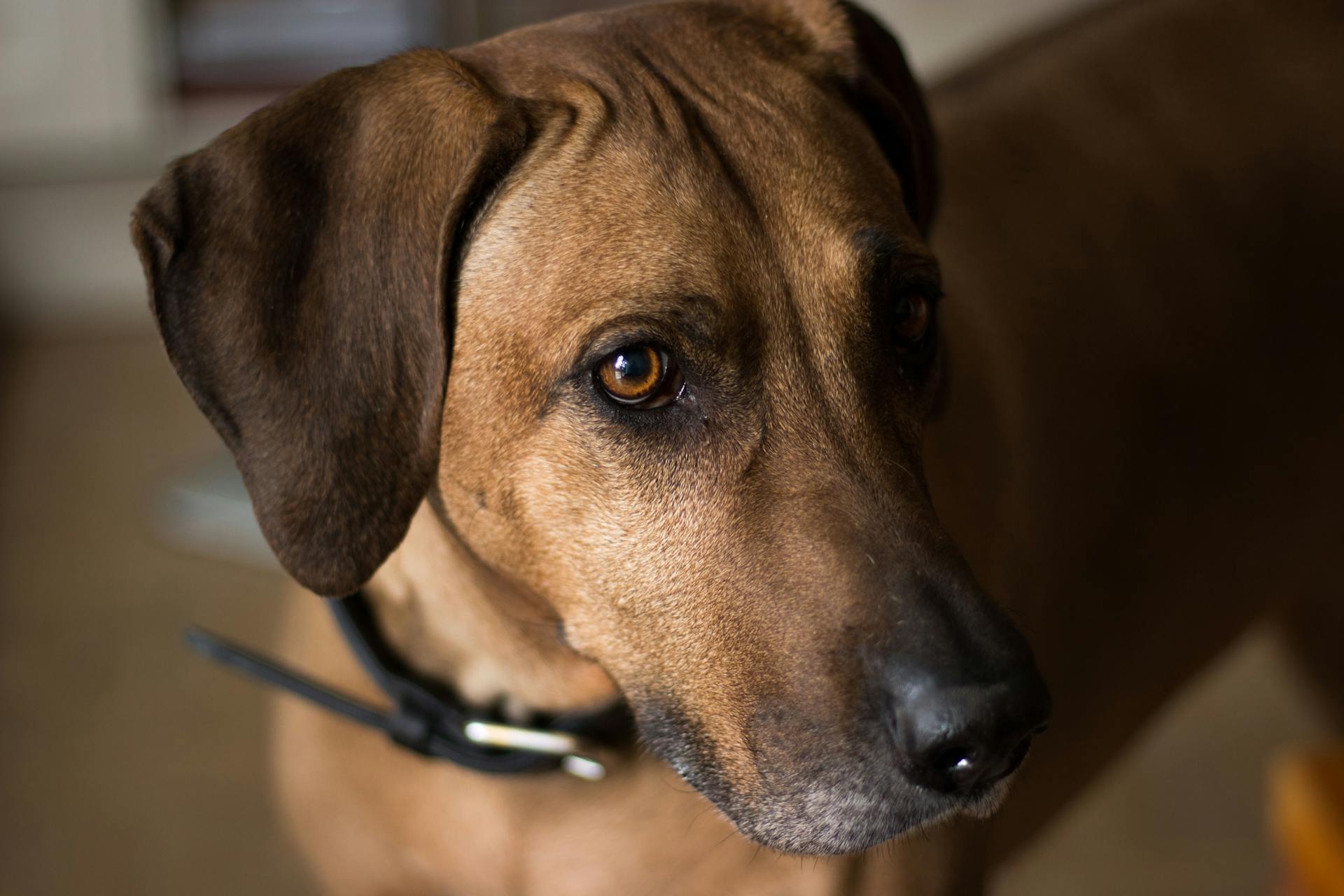
If you're looking for breeds that are similar to the Rhodesian Ridgeback in terms of maintenance, you're in luck. The Canadian Eskimo Dog requires a lot of exercise and attention, making it a great match for active owners.
The Weiler Dane is another breed that's similar in terms of maintenance. It needs regular exercise and training to stay happy and healthy.
If you're willing to put in the work, the Carolina Dog can thrive in a home with plenty of attention and exercise. It's an independent breed, but it still needs regular interaction with its owners.
The Smalandsstovare is a Swedish breed that's similar to the Rhodesian Ridgeback in terms of its high energy level and need for regular exercise.
The Black and Tan Coonhound is a great choice for hunters or outdoor enthusiasts, as it needs plenty of exercise and mental stimulation to stay happy and healthy.
Here are some breeds that are 100% similar to the Rhodesian Ridgeback in terms of maintenance:
- Canadian Eskimo Dog
- Weiler Dane
- Carolina Dog
- Smalandsstovare
- Black and Tan Coonhound
Frequently Asked Questions
Are Rhodesian Ridgebacks still used to hunt lions?
No, Rhodesian Ridgebacks are not capable of killing lions, despite their name. They were originally bred for hunting smaller game, not lions.
What dog breed hunts lions?
The Rhodesian Ridgeback is a breed known for hunting lions in the savannah. Also known as the African Lion Hound, this dog is a skilled hunter and tracker.
Why were Rhodesian Ridgebacks bred to hunt lions?
Rhodesian Ridgebacks were originally bred to track and hold prey, including lions, until the hunter arrived. Their early use in lion hunting led to the misconception that they were bred specifically for this purpose.
Sources
- https://en.wikipedia.org/wiki/Rhodesian_Ridgeback
- https://www.britannica.com/animal/Rhodesian-ridgeback
- https://blog.parnell.com/en-us/rhodesian-ridgebacks-athletic-affectionate-at-risk
- https://www.thesprucepets.com/breed-profile-rhodesian-ridgeback-1117992
- https://wagwalking.com/breed/rhodesian-ridgeback
Featured Images: pexels.com
